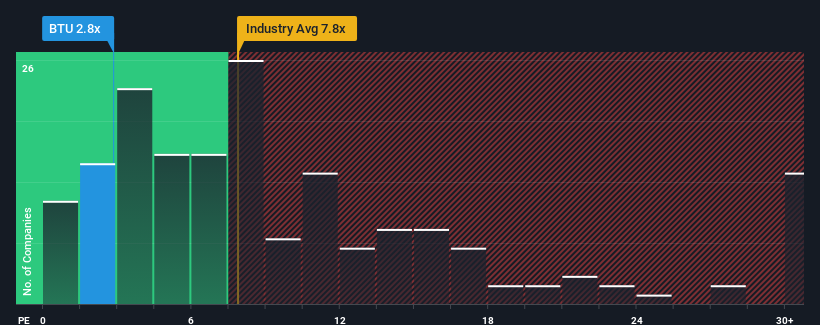- United States
- /
- Oil and Gas
- /
- NYSE:BTU
Earnings Working Against Peabody Energy Corporation's (NYSE:BTU) Share Price

Peabody Energy Corporation's (NYSE:BTU) price-to-earnings (or "P/E") ratio of 2.8x might make it look like a strong buy right now compared to the market in the United States, where around half of the companies have P/E ratios above 17x and even P/E's above 32x are quite common. Nonetheless, we'd need to dig a little deeper to determine if there is a rational basis for the highly reduced P/E.
There hasn't been much to differentiate Peabody Energy's and the market's retreating earnings lately. It might be that many expect the company's earnings performance to degrade further, which has repressed the P/E. You'd much rather the company wasn't bleeding earnings if you still believe in the business. In saying that, existing shareholders may feel hopeful about the share price if the company's earnings continue tracking the market.
View our latest analysis for Peabody Energy

Does Growth Match The Low P/E?
In order to justify its P/E ratio, Peabody Energy would need to produce anemic growth that's substantially trailing the market.
Taking a look back first, we see that there was hardly any earnings per share growth to speak of for the company over the past year. Likewise, not much has changed from three years ago as earnings have been stuck during that whole time. Accordingly, shareholders probably wouldn't have been satisfied with the complete absence of medium-term growth.
Looking ahead now, EPS is anticipated to slump, contracting by 32% per annum during the coming three years according to the four analysts following the company. With the market predicted to deliver 13% growth per year, that's a disappointing outcome.
In light of this, it's understandable that Peabody Energy's P/E would sit below the majority of other companies. However, shrinking earnings are unlikely to lead to a stable P/E over the longer term. Even just maintaining these prices could be difficult to achieve as the weak outlook is weighing down the shares.
The Bottom Line On Peabody Energy's P/E
While the price-to-earnings ratio shouldn't be the defining factor in whether you buy a stock or not, it's quite a capable barometer of earnings expectations.
As we suspected, our examination of Peabody Energy's analyst forecasts revealed that its outlook for shrinking earnings is contributing to its low P/E. Right now shareholders are accepting the low P/E as they concede future earnings probably won't provide any pleasant surprises. It's hard to see the share price rising strongly in the near future under these circumstances.
Before you take the next step, you should know about the 2 warning signs for Peabody Energy that we have uncovered.
If P/E ratios interest you, you may wish to see this free collection of other companies with strong earnings growth and low P/E ratios.
New: Manage All Your Stock Portfolios in One Place
We've created the ultimate portfolio companion for stock investors, and it's free.
• Connect an unlimited number of Portfolios and see your total in one currency
• Be alerted to new Warning Signs or Risks via email or mobile
• Track the Fair Value of your stocks
Have feedback on this article? Concerned about the content? Get in touch with us directly. Alternatively, email editorial-team (at) simplywallst.com.
This article by Simply Wall St is general in nature. We provide commentary based on historical data and analyst forecasts only using an unbiased methodology and our articles are not intended to be financial advice. It does not constitute a recommendation to buy or sell any stock, and does not take account of your objectives, or your financial situation. We aim to bring you long-term focused analysis driven by fundamental data. Note that our analysis may not factor in the latest price-sensitive company announcements or qualitative material. Simply Wall St has no position in any stocks mentioned.
About NYSE:BTU
Peabody Energy
Engages in coal mining business in the United States, Japan, Taiwan, Australia, India, Brazil, Belgium, Chile, France, Indonesia, China, Vietnam, South Korea, Germany, and internationally.
Very undervalued with flawless balance sheet.
Similar Companies
Market Insights
Community Narratives




